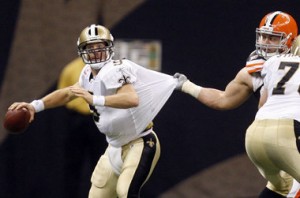Over the past few seasons, the NFL has become more and more offensive, with the group of aggressive quarterbacks growing at a pace, and passing records falling at a similar rate.
Many fans and football betting experts have started to ask whether this passing “craze” in the NFL is out of control, or is it just a phase that we are going through? Will defences soon catch up with the pass-happy teams?
By looking at the trends of the game, there is no doubt that an unusual number of records have been broken in just the last five years. Rookie passing records, along with non-rookie records, are falling faster than ever imagined
There are many different facets to the way quarterbacks play, but there are three main reasons for the recent upsurge in record-breaking behaviour.
The first (and possibly foremost) reason that we are seeing passing teams succeed and continue to break records is the formations that they are starting out of on offence. More now than ever, teams are using three- and four-receiver sets as their primary offense.
Just look at the New Orleans Saints, the Green Bay Packers, and the Detroit Lions; all three teams thrive out of three-wide sets. That shift in offence shape has put more and more pressure on offensive linemen and the quarterbacks who are asked to throw the ball more and make even quicker decisions than before.
Not to mention that some spread offenses call for the quarterback to call or even change the play at the line of scrimmage.
Teams used to groom a quarterback; look at Aaron Rodgers, now arguably the best quarterback in the NFL. He waited his chance for three years before becoming a starter in 2008. Now, teams do not have time to behave this way, and top-class college prospects are coming into the league much more readily than before.
More colleges are now running pro-style offenses, which often translate into similar verbiage, and plenty of them have become used to running a spread-type offence.
Recent rule changes have also been framed to help offences. Every year, it seems as if some new rule is introduced to help out the offense or the quarterback in some way, shape, or form.
The league appears to be obsessed with player safety but, really, it has caused the NFL to become less aggressive, and made defensive players alter their games.
A case in point would be the number of defensive pass interference calls that are being made. In 2008, there was a pass interference call once on every 105 throws a quarterback made; in 2011, a quarterback got a pass interference call once every 80 throws.
That statistic alone should show you how defensive penalties sustain drives, and allow quarterbacks another opportunity to rack up the offensive passing yards.
For those three reasons, we should see more passing records fall in 2012, and the NFL will continue to be a pass-orientated league. Make sure you place your NFL bets with the current playing trends in mind .
